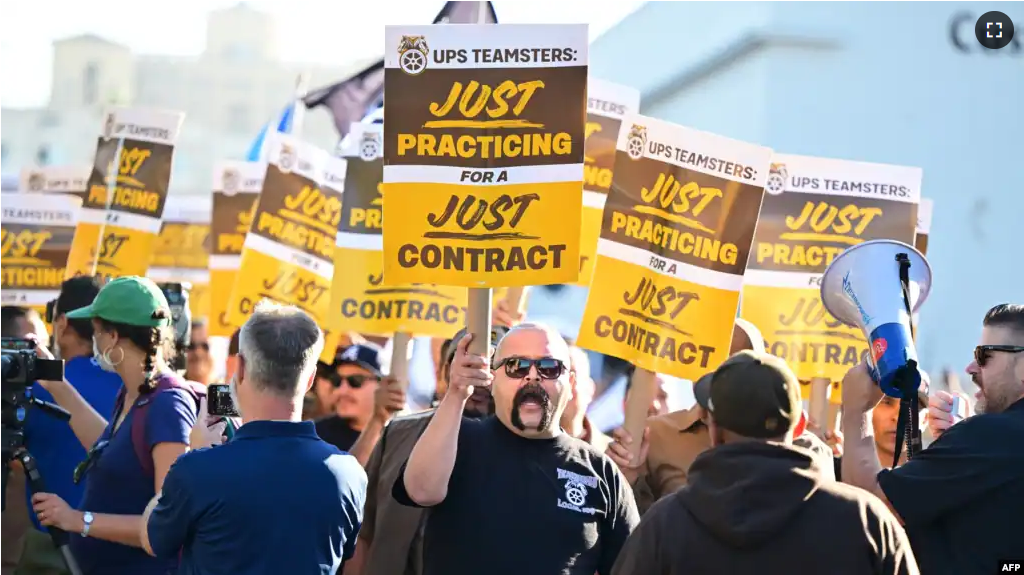From truck drivers to Hollywood actors, many workers in the United States are complaining about low pay and long hours.
The unhappiness is a result of changes in technology and the economy. And worker’s jobs have changed as companies try to meet customer expectations for speed and ease.
Delivery drivers
Jeffrey Palmerino is a driver for the delivery company United Parcel Service (UPS) near Albany, New York. The full-time driver said he was forced to work overtime during the pandemic to deal with a large increase in orders. And 14-hour days in trucks without air conditioning became usual.
“For two straight years… A lot of us were forced to work six days a week, and that is not any way to live your life,” said Palmerino.
The working conditions led to talk of a strike by a labor group known as the Teamsters. But UPS and the Teamsters last week reached an early deal that would put off the strike. Labor activists said the deal would pressure other companies facing labor issues to raise their standards.
Patricia Campos-Medina is with the Worker Institute at the School of Industrial and Labor Relations at Cornell University. The Institute released a report this year that found the number of U.S. labor strikes rose 52 percent in 2022.
“The whole idea that consumer convenience is above everything broke down during the pandemic. We started to think, ‘I’m at home ordering,’…. but there is actually a worker who has to go the grocery store, who has to cook this for me so that I can be comfortable,’” Campos-Medina said.

Screenwriters and actors
Some UPS drivers recently joined the Writer’s Guild of America (WGA) for protests.
Hollywood screenwriters and actors are holding their first strikes in 40 years because the rise of streaming services has changed entertainment economics. The result has been decreased pay and faster production times with smaller teams.
Actors and writers have long depended on residuals, or long-term payments, for reruns and other airings of films and television shows. But reruns do not exist on streaming services, where shows and movies are available at all times.
There is also no easy way, such as ticket sales or ratings, to determine their popularity. As a result, streaming services often pay little for residuals.
Adam Shapiro is an actor known for the Netflix hit Never Have I Ever. He said many actors were happy at first to accept lower pay for the sudden increase in acting jobs that streaming services offered. But the need for better pay gained urgency when it became clear streaming is the future of the business, he said.
“Over the past 10 years, we realized: ‘Oh, that’s now how Hollywood works. Everything is streaming,’” Shapiro said during a recent union event.
Shapiro said he agreed to a deal offering 20 percent of his normal pay for Never Have I Ever because it seemed like “a great opportunity, and it’s going to be all over the world.” He added, “Unfortunately, we’re all starting to realize that if we keep doing this we’re not going to be able to pay our bills.”
Danielle Sanchez-Witzel is co-creator of the recently released Netflix show Survival of the Thickest. She said television shows traditionally hire a team of writers for the length of the series production. However, Netflix only lets her keep one writer after pre-production to deal with any changes in the story.
“It’s not sustainable and I’ll never do that again,” the screenwriter said.
I’m John Russell.
Alexandra Olson reported on this story for the Associated Press. John Russell adapted it for VOA Learning English.
___________________________________________________
Words in This Story
delivery – n. the act of taking something to a person or place
overtime – n. time spent working at your job that is in addition to your normal working hours
standard – n. a level of quality, achievement, etc., that is considered acceptable or desirable
streaming – n. playing shows or films by using data sent over the Internet
opportunity – n. an amount of time or a situation in which something can be done
ticket – n. a piece of paper that allows you to see a show
sustainable — adj. able to last or continue for a long time
